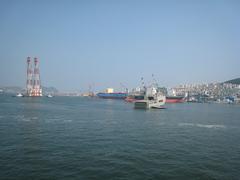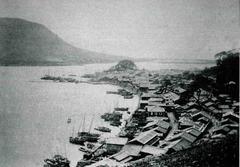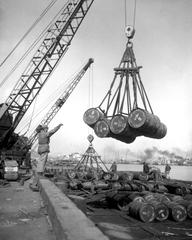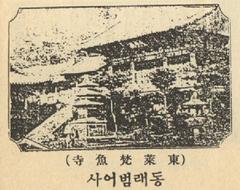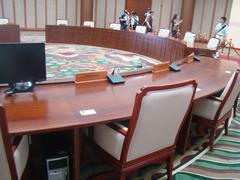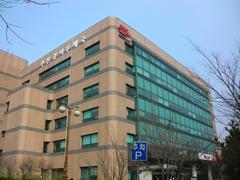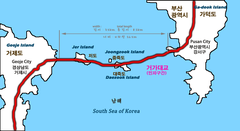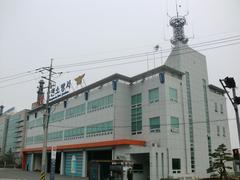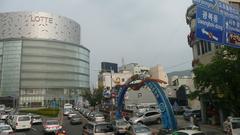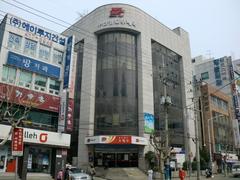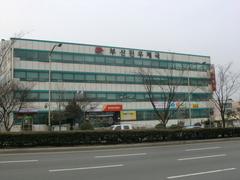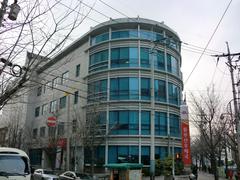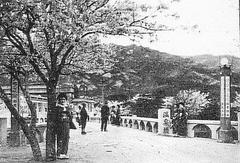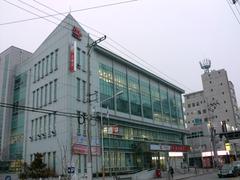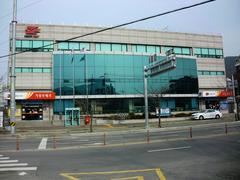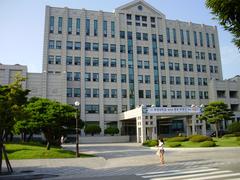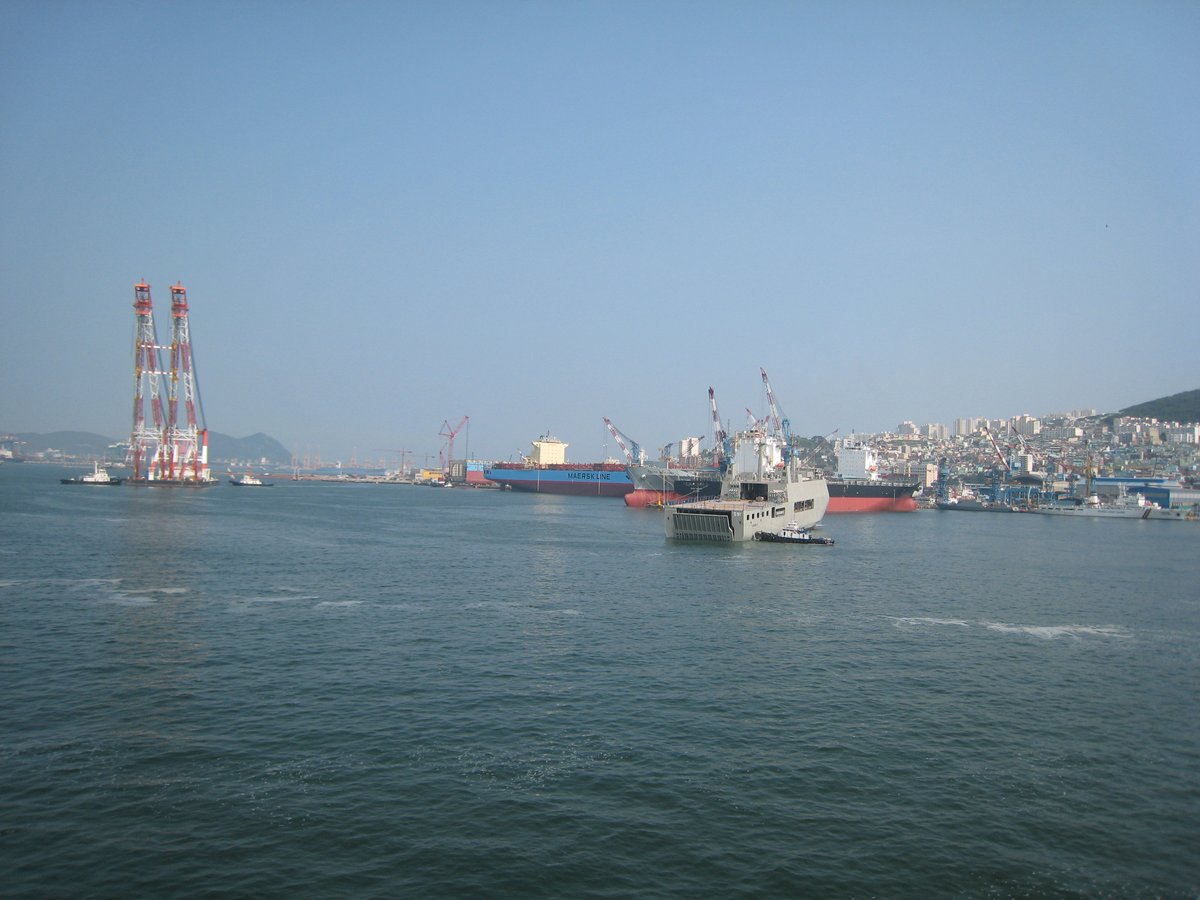
Port of Busan Visiting Hours, Tickets, and Travel Guide for Busan Historical Sites
Date: 14/06/2025
Introduction
The Port of Busan is South Korea’s largest and busiest maritime gateway, serving as a linchpin in global trade and a vibrant symbol of the nation’s economic vitality and cultural diversity. Situated on the southeastern tip of the Korean Peninsula, Busan’s natural harbor has played a pivotal role in connecting Korea with the wider world for centuries. This comprehensive guide provides detailed information for visitors—including port history, visiting hours, ticketing, accessibility, transportation, and must-see nearby attractions—ensuring a rewarding experience whether you are a maritime enthusiast, traveler, or logistics professional. (Open Korea; Zeymarine; MarineLink)
Historical Background and Significance
Ancient and Early Maritime Trade
Busan’s advantageous coastal location has made it a key maritime center since the Goryeo Dynasty (918–1392), evidenced by archaeological finds that suggest early trade with neighboring regions, especially China and Japan. During the Three Kingdoms period, Busan’s harbor became a crucial conduit for cultural and economic exchanges, with local goods such as rice, ceramics, and textiles traded across East Asia. (Open Korea)
Modernization and Global Emergence
Busan officially opened as Korea’s first international port in 1876, marking its transformation into a gateway for global commerce. The port developed rapidly, especially during the Japanese occupation (1910–1945), and was pivotal during the Korean War (1950–1953) as a refuge and logistics hub. In the postwar era, the port fueled Busan’s industrialization and urban growth, evolving into one of the world’s top container ports. (Zeymarine; Open Korea)
Today’s Economic and Strategic Role
Currently, the Port of Busan ranks among the top six busiest container ports globally, handling over 22 million TEUs annually. As the world’s second-largest transshipment hub, it connects Asia to Europe, North America, and beyond. The port is essential to South Korea’s export-driven economy, accounting for a significant portion of national GDP. (MarineLink; Sustainable World Ports)
Port Infrastructure and Visitor Facilities
Terminal Layout and Operations
The port consists of:
- North Port: Near the city center, handling passenger ferries, cruise ships, and general cargo.
- Busan New Port: On Gadeok Island, designed for ultra-large container vessels with cutting-edge logistics and automation.
- Other Terminals: Gamcheon and Dadaepo handle various cargo types.
The North Port area is being redeveloped into a vibrant waterfront district with parks, cultural venues, and shopping centers, enhancing its appeal to visitors. (Busan Metropolitan City)
Key Facilities
- International Passenger Terminal: Major hub for cruise and ferry arrivals/departures. Open daily from 6:00 AM to 10:00 PM. Facilities include customs, immigration, currency exchange, duty-free shops, cafes, luggage storage, and free Wi-Fi. (Visit Busan)
- Information Centers: Staffed by multilingual personnel, located at Busan Station and the terminal.
- Accessibility: Elevators, ramps, accessible restrooms, and clear signage ensure comfort for all travelers.
Visiting Hours and Tickets
- International Passenger Terminal: 6:00 AM – 10:00 PM daily.
- North Port Waterfront Park: Open from dawn until 10:00 PM, free entry.
- Jagalchi Fish Market: 5:00 AM – 10:00 PM.
- Taejongdae Resort Park: Open 24 hours; visitor center 9:00 AM – 6:00 PM.
- Ferry and Cruise Tickets: Available online or at the terminal; prices vary by destination and service, with ferries to Japan starting at approximately 50,000 KRW one way.
No general entry fee is required for the port area; tickets are needed for cruises, ferries, and some guided tours.
Getting There and Around
- By Train: KTX high-speed trains from Seoul arrive at Busan Station, which is a 10–15 minute walk or quick taxi ride from the port.
- By Subway/Metro: Line 1 connects Busan Station and major city districts.
- By Bus/Taxi: City buses and taxis serve the port area; cruise passengers may have shuttle service.
- By Air: Gimhae International Airport is 40 minutes by taxi or bus. (Korea Travel Planning; A Fun Couple)
Attractions and Activities
In and Around the Port
- Busan Port International Passenger Terminal: Modern terminal with harbor views, shops, and cafes.
- North Port Waterfront Park: Walking paths, public art, and festival venues; open year-round.
- Harbor Cruises: Sightseeing and dinner cruises depart from the terminal, with English/Korean commentary. Tickets range from 15,000–50,000 KRW.
- Jagalchi Fish Market: Korea’s largest seafood market, ideal for sampling fresh catches and local specialties.
- Gamcheon Culture Village: Colorful hillside village renowned for street art and cultural experiences.
- Taejongdae Resort Park: Panoramic sea views, lighthouse, and nature trails.
Annual Events
- Busan Port Festival: Late May, features ship tours, maritime parades, live performances, and fireworks.
- Korea International Ocean Film Festival: May, with marine-themed screenings and exhibitions.
- Busan Sea Festival: August, with water sports and concerts.
- Busan Fireworks Festival: November, with spectacular displays over the harbor. (Busan Metropolitan City; Visit Busan)
Practical Visitor Tips
- Best Time to Visit: Spring (April–June) and autumn (September–November) offer mild weather and coincide with major festivals.
- What to Bring: Passport (for international travel), comfortable shoes, weather-appropriate attire, and both cash and cards.
- Connectivity: Free Wi-Fi is widely available; consider a local SIM/eSIM for broader coverage.
- Luggage Storage: Coin lockers and staffed storage at the terminal and Busan Station.
- Safety: The port is well-patrolled and secure; remain in designated public areas.
Accessibility
The port and its terminals are designed for accessibility, with elevators, ramps, and signage in English, Korean, and Japanese. Staff can assist visitors with mobility needs.
FAQ – Frequently Asked Questions
Q: What are the visiting hours for the Port of Busan?
A: The International Passenger Terminal is open from 6:00 AM to 10:00 PM. Public parks and waterfront areas are generally accessible from dawn until 10:00 PM.
Q: Are tickets required to visit the Port of Busan?
A: No entry fee for public areas; tickets are needed for ferries, cruises, and some tours.
Q: Can I book harbor cruises or guided tours?
A: Yes, via the terminal, online, or through local tour operators.
Q: Is the port accessible for visitors with disabilities?
A: Yes, facilities include elevators, ramps, accessible restrooms, and multilingual staff.
Q: How do I get to the port from Busan Station or the airport?
A: The port is a short walk or taxi ride from Busan Station, and about 40 minutes from Gimhae International Airport by taxi or airport limousine bus.
Visual Highlights
Sustainability and Future Development
The Busan Port Authority is leading sustainable port initiatives, including automation, digital logistics, and green practices. The North Port Redevelopment Project aims to further integrate tourism, business, and cultural amenities, creating a world-class waterfront for locals and visitors alike. (Busan Metropolitan City; Busan Port Authority)
Summary and Recommendations
The Port of Busan is a dynamic nexus of global commerce, rich history, and vibrant urban culture. Visitors can expect efficient transport, accessible and modern facilities, and a variety of engaging activities—from harbor cruises and festivals to seafood markets and cultural landmarks. For the best experience, plan your visit around key events, use public transportation for easy access, and consult official resources for the latest updates. (Open Korea; Zeymarine; Visit Busan)
Sources and Further Reading
- Open Korea
- Zeymarine
- MarineLink
- TopAsiaTour
- Visit Busan
- Korea Travel Planning
- Busan Metropolitan City
- Busan Port Authority
Explore More
Plan your visit today! Download the Audiala app for real-time event updates, ticketing, and personalized travel tips. For more on Busan’s history, transportation, and attractions, check our related guides and follow us on social media.
